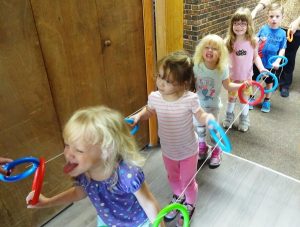Posts by Patti H
Dr. O’Shea Honored with Honorary Conductor Award
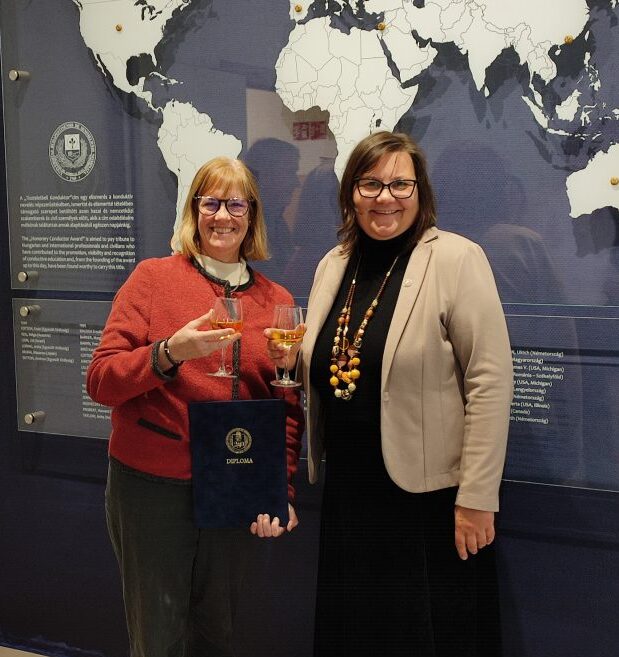
April 28, 2023, APF Welcomes a New Honorary Conductor!
We are delighted to congratulate Dr. Roberta Kuchler O’Shea on being awarded the prestigious Honorary Conductor Award by Semmelweis University and the András Peto Institute in Hungary, as acknowledged on their website.
We are deeply appreciative of Dr. O’Shea’s unwavering support of Conductive Education through research, advocacy, and education, and we thank her for the countless volunteer hours she has contributed to the Center, staff, board, and families.
Congratulations, Robbie!
Hope is the Foundation CFI’s work
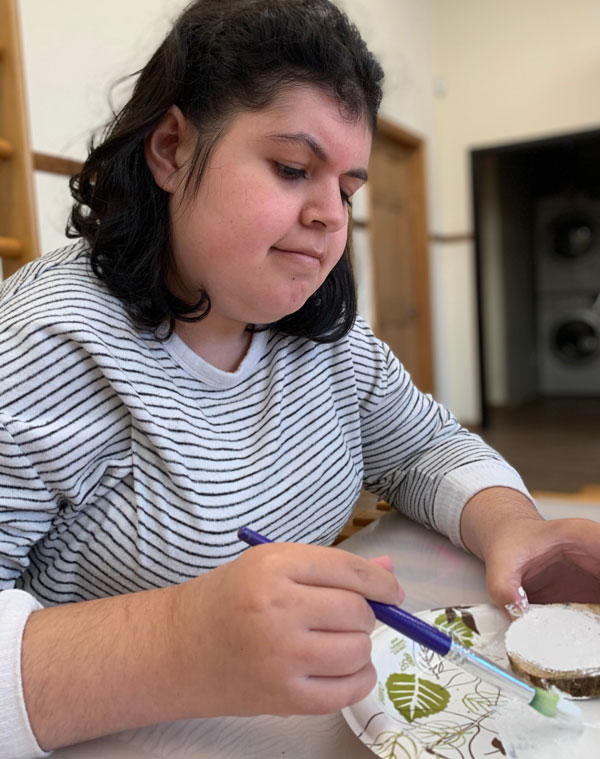 Our vision is that all people with disabilities should expect to live with dignity and pride in who they are. The Center’s programs help children and young adults with disabilities gain the confidence and skills they need to lead self-determined lives filled with purpose.
Our vision is that all people with disabilities should expect to live with dignity and pride in who they are. The Center’s programs help children and young adults with disabilities gain the confidence and skills they need to lead self-determined lives filled with purpose.
The last two years of living through a Pandemic has been exhausting for the entire world. Like everyone else, we are relieved that there is finally light at the end of a very long tunnel. This year will be exciting and filled with renewed hope. Our Therapy Programs are back to pre-Covid levels and the Center’s Working Together Chicago program is getting young adults with disabilities back to work! We are also thrilled to announce that this year the Center will completely renovate our Countryside location – after 22 years of constant use, it is in need of an upgrade!
Our heartfelt thanks to all of you, our generous supporters, who have helped keep the Center operating in person throughout this crisis. Your support gave hope to the Center staff, our children, young adults and families, to come out stronger and remain confident that great new opportunities are ahead of us.
Please read the Center’s Annual Report that came out March 2022!
Dr. Roberta O’Shea, PhD, DPT – 2nd American to receive Honorary Conductor Award!
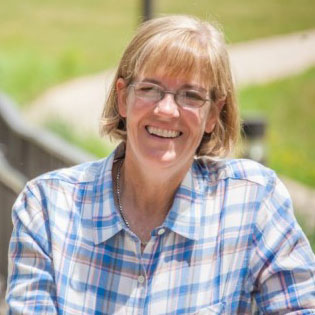
Our very own Dr. Roberta O’Shea, PhD, DPT was presented the 2020 Honorary Conductor Award by the Andras Peto Faculty of Semmelweis University, and the International Peto Association for her outstanding contribution to the field of Conductive Education. Dr. O’Shea is the second American to receive this award in 30 years. Congratulations to our dear friend “Robbie” on this well-deserved honor – we are all so proud and grateful for you!
Robbie is a founding Board Member of the Center and for the past 20 years has dedicated her career to education and improving the lives of underserved children and young adults with physical disabilities. She was instrumental in helping the Center design a successful transdisciplinary team of Conductive Education Teachers, Physical Therapists, and Occupational Therapists who work seamlessly in delivering a quality Conductive Education Program. Robbie has also written over 15 publications on Conductive Education and participated in 8 CE-related research studies.
Bravo Dr. O’Shea! Our heartfelt thanks for giving so much of your time and talent to ensure children with disabilities grow up healthy and able to reach their full potential, regardless of their income or insurance status.
On the Table 2018 – “Getting my Wheel in the Door”
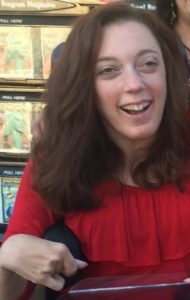 Getting my Wheel in the Door
Getting my Wheel in the Door
Being a person with a physical disability, I know the struggles the disabled community faces when it comes to fully-participating in society. While our communities are more accessible than in the past, physical barriers still remain. It makes me wonder: what obstacles exist in our communities that our able-bodied friends do not encounter? If we, individuals with disabilities or those that use assistive devices, cannot “get in the door”, we cannot fully participate.
On the Table Conversation
This year, I led the Center for Independence staff in a discussion for On the Table. The theme of our conversation was about accessibility within our communities. I asked my co-worker’s thought-provoking questions such as: What barriers exist in our communities for individuals that use assistive devices? How are we as a society spreading awareness to able-bodied individuals regarding these restrictions? And lastly, how can we resolve the issues surrounding accessibility so all community members have equal access?
Americans with Disabilities Act (ADA)
“Legislation passed in 1990 that prohibits discrimination against people with disabilities. Under this Act, discrimination against a disabled person is illegal in employment, transportation, public accommodations, communications and government activities.”
With the passing of ADA in 1990, guidelines were set that required accessibility for anyone who uses any kind of assistive device. Doorways, aisles, and hallways need to be of a certain width for patrons who use mobility devices. Restaurants should have tables that are high enough for a wheelchair to fit under, and so on. But often, just because there is a sign saying an establishment is accessible, it does not necessarily guarantee it is the case.
If a person using a mobility device has to use a back entrance which is primarily used to take out the trash, it most definitely should not be considered accessible. If someone is physically unable to open a door, and there is not a push button available, this makes them physically dependent upon someone else to open it for them. As my friend and fellow social worker, Kathleen Downes, MSW so eloquently articulated: “Accessibility is about addressing architectural and physical barriers. Inclusion is about having welcoming attitudes to match. One is meaningless without the other. Inclusion and accessibility rely on one another.”
Breaking Barriers to Accessibility
You may not personally use an assistive device to access the community, but you most likely know someone who does. A mother pushing her infant in a stroller, an elderly person who relies on their walker, or perhaps a friend with a disability who uses a power wheelchair. We can all benefit from reducing or eliminating barriers within our communities to create a more inclusive environment. My mission, which emerged following the “On the Table” discussion this year, is to spread awareness of these accessibility barriers and work to eliminate or reduce them. Let’s work together to open doors for all!
Please feel free to continue the conversation and share your comments, thoughts or personal experiences related to accessibility.
Link to Facebook
— Ani Hunt, MSW, LSW
Ani Hunt is a licensed social worker who works with children with Cerebral Palsy who attend the Center for Independence, as well as their siblings and parents.
The Center Celebrates 20 Years!
Dear friends of the Center,
This year marks the Center’s 20th anniversary! We’ve grown from serving six children out of a local church to over 250 children per year at four locations throughout the Chicagoland area! What an amazing adventure, filled with so many wonderful people and beautiful moments.
In 1998, our original Board of Directors made a pledge that the Center would never turn a child away due to lack of insurance or inability to pay. Generous donors like you have allowed us to keep that commitment! Over the past 20 years the Center has served over 650 children and young adults with physical disabilities and given nearly $11million in charitable services. The Center has been a safety-net for children who are often turned away.
The Center is grateful to the many people who have helped our program grow and flourish: our Board of Directors; generous donors who support our program; talented professional staff who help children achieve their highest level of independence; and finally, parents who entrust us with their children.
Learning that your baby has cerebral palsy can be incredibly devastating for young parents and often results in many stressful unanswered questions: “Will my baby be okay?” “Will my baby grow up healthy and included?” “What does the future look like for my child?” The past 20 years have proven that despite challenges, the future is bright!
Families raising children with physical disabilities should dream big! Kids with cerebral palsy are happy, engaged, curious, and full of joy – just like their able-bodied peers. We have celebrated alongside families as their child achieved milestones including high school graduations, transitioning to college, entering the workforce, and living in the community independently. Given the opportunity, children with physical disabilities can do anything that they set their mind to – we witness that each and every day at the Center!
Thank you for your support over the past 20 years – your kindness has allowed us to help families believe in endless possibilities. We look forward to sharing many success stories of independence for years to come!
— Patricia Herbst, Executive Director

